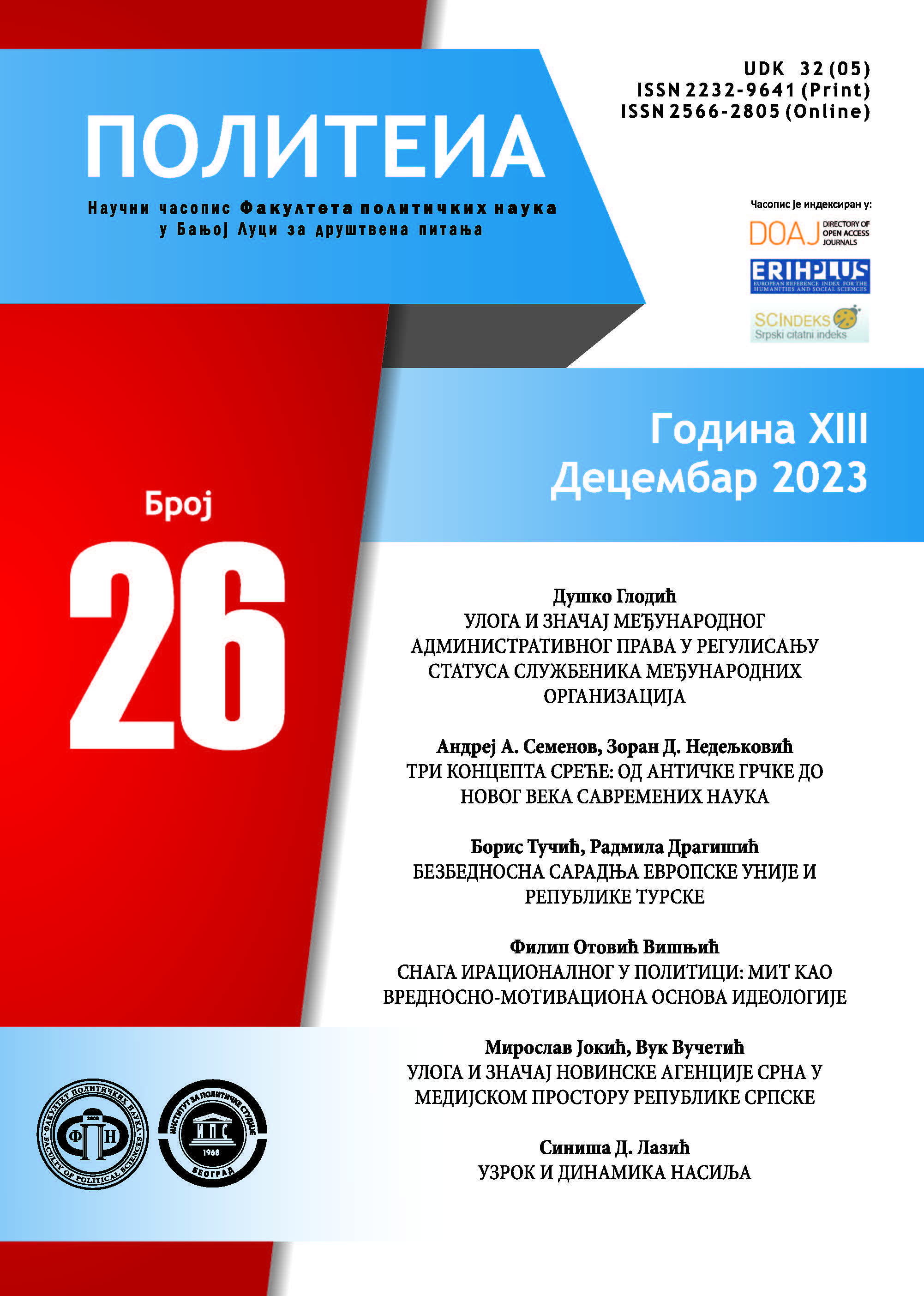THE POWER OF THE IRRATIONAL IN POLITICS: MYTH AS A VALUE AND MOTIVATIONAL BASIS OF IDEOLOGY
Abstract
The text asserts the thesis that myths determine not only the foundational values of political culture and communication but also the entire cognitive perspective and its boundaries. Moreover, myths have an undisputed function in affirming political will, both in accepting the way society is organized and in radically opposing certain aspects or the totality of it. Therefore, myths, as an irrational, axiological, and motivational foundation, represent an endless source for all forms of political persuasion. They constitute the core of modern ideological systems, which rationalize myths for the reproduction of social practice. The first part of the work offers a general critique of the essential demand of Enlightenment rationalism for 'liberation' from a mythical experience of existence. The second part presents arguments for why political myth as a phenomenon persists in modern times. The third part explains the reasons for the emergence and mechanisms of functioning of ideologies as responses to the crisis of meaning in mass, technologically structured societies.
References
Altiser, L. (2015). Ideologija i državni ideološki aparati. Loznica: Karpos.
Atlagić, S. (2012). Nacistička propaganda. Beograd: Fakultet političkih nauka, Čigoja štampa.
Otović Višnjić, F. (2020). Terorizam kao vid političkog komuniciranja: upotreba propagande nasilnom akcijom u borbi oko hegemonije. Međunarodni problemi, 72(4): 709‒732.
Bart, R. (1971). Književnost, Mitologija, Semiologija. Beograd: Nolit.
Bodrijar. Ž. (1991). Simulakrumi i simulacija. Novi Sad: Svetovi.
Bottici, C. (2009). Philosophies of Political Myth, a Comparative Look Backwards: Cassirer, Sorel and Spinoza. European Journal of Political Theory, 8(3): 365‒382.
Čapo E. (2008). Teorije mitologije. Beograd: Clio.
Đorđević, J. (2009). Postkultura. Beograd: Clio.
Đurić, M. (2023). Mit, nauka, ideologija: nacrt filozofije kulture. Beograd: ITV Centar plus.
Elijade, M. (2020). Mitovi, snovi i misterije. Novi Sad: Akademska knjiga.
Ellul, J. (1965). Propaganda: The Formation of Men’s Attitudes, New York: Vintage books.
Friedrich C. J. (1963), Man and His Government. New York: McGraw-Hill.
Horkheimer M. i Adorno T. W. (1989). Dijalektika prosvjetiteljstva. Sarajevo: Veselin Masleša – Svjetlost.
Kasirer, E. (1972a). Jezik i mit. Novi Sad: Tribina mladih.
Kasirer, E. (1972b). Mit o državi. Beograd: Nolit, Symposion.
Kolakovski, L. (1989). Prisutnost mita. Beograd: Rad.
Malinovski, B. (1971). Magija, nauka i religija. Beograd: Prosveta.
Manhajm K. (1963). Ideologija i utopija. Beograd: Nolit.
Manhajm K. (1968). Ideologija i utopija. Beograd: Nolit.
Marcuse H. (1968). Čovijek jedne dimenzije. Sarajevo: Veselin Masleša.
Matić, M. (1998). Mit i politika: rasprava o osnovama političke kulture. Beograd: Fakultet političkih nauka – Čigoja štampa.
Merton. R. K. (1968). Social theory and social structure. New York: The Free press
Slavujević, Z. (1986). Savremeni politički mit. Beograd: Radnička štampa.
Sorel G. (1980). Revolucija i nasilje. Zagreb: Globus.
Tjudor, H. (2002). Politički mit. U Č. Čupić (ur.), Politička antropologija (str. 225‒255). Beograd: Fakultet političkih nauka, Čigoja štampa.
Žirarde, R. (2000). Politički mitovi i mitologije. Zemun: Biblioteka XX vek, Beograd: Plato.
Autori koji objavljuju u ovom časopisu pristaju na sljedeće uslove:
- Autori zadržavaju autorska prava i pružaju časopisu pravo prvog objavljivanja rada i licenciraju ga "Creative Commons Attribution licencom" koja omogućava drugima da dijele rad, uz uslov navođenja autorstva i izvornog objavljivanja u ovom časopisu.
- Autori mogu izraditi zasebne, ugovorne aranžmane za neekskluzivnu distribuciju članka objavljenog u časopisu (npr. postavljanje u institucionalni repozitorijum ili objavljivanje u knjizi), uz navođenje da je članak izvorno objavljen u ovom časopisu.
- Autorima je dozvoljeno i podstiču se da postave objavljeni članak onlajn (npr. u institucionalni repozitorijum ili na svoju internet stranicu) prije ili tokom postupka prijave rukopisa, s obzirom da takav postupak može voditi produktivnoj razmjeni ideja i ranijoj i većoj citiranosti objavljenog članka (Vidi Efekti otvorenog pristupa).

